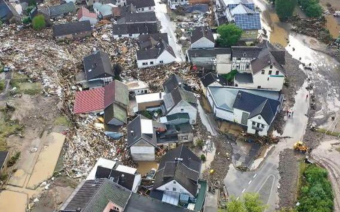
Climate change has made extreme rainfall events similar to those that led to last month’s floods in Germany, Belgium, the Netherlands and Luxembourg between 1,2 and 9 times more likely to happen, according to a rapid attribution study by an international team of climate scientists, which also found that such downpours in the region are now 3-19 percent heavier because of human-caused warming.
The results reinforce the conclusions of the new report by the Intergovernmental Panel on Climate Change (IPCC), which said there is now unequivocal evidence that humans are warming the planet’s climate and human-caused climate change is the main driver of changes in weather extremes. The report found that, as temperatures rise, Western and Central Europe will be exposed to increasing extreme rainfall and flooding.
Extreme rainfall hit parts of Western Europe from 12-15 July. More than 90mm fell over a single day around the Ahr and Erft rivers in Germany, far more than previous records. The resulting floods killed at least 220 people in Belgium and Germany.
More:
“This event demonstrates once again in 2021. that extremes breaking observed records by far, exacerbated by climate change, can strike anywhere, induce huge damages and cause fatalities. Western Europe’s local and national authorities need to be aware of the increasing risks from extreme precipitation to be better prepared for potential future events,” said Dr. Frank Kreienkamp, Head of the Regional Climate Office Potsdam, Deutscher Wetterdienst (German weather service).
The study was conducted by 39 researchers as part of the World Weather Attribution group, including scientists from universities and national meteorological and hydrological agencies in Belgium, France, Germany, Luxembourg, the Netherlands, the US and the UK. This international collaboration analyses and communicates the possible influence of climate change on extreme weather events, such as storms, extreme rainfall, heatwaves, cold spells, and droughts.
You can read the whole report HERE.
Source: World Meteorological Organzation



